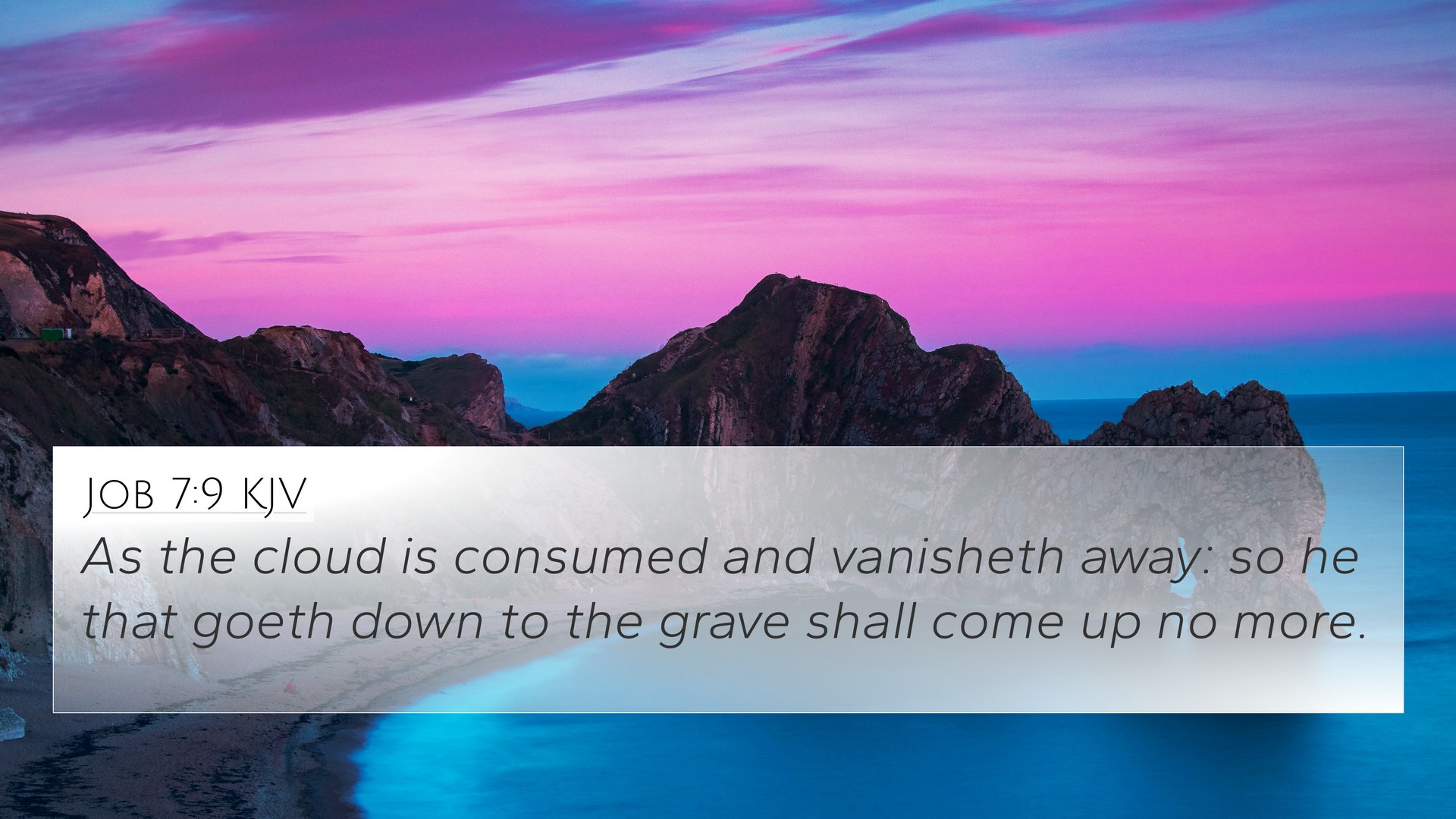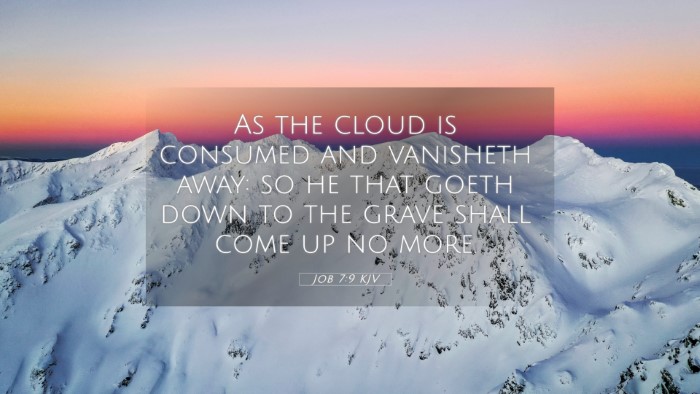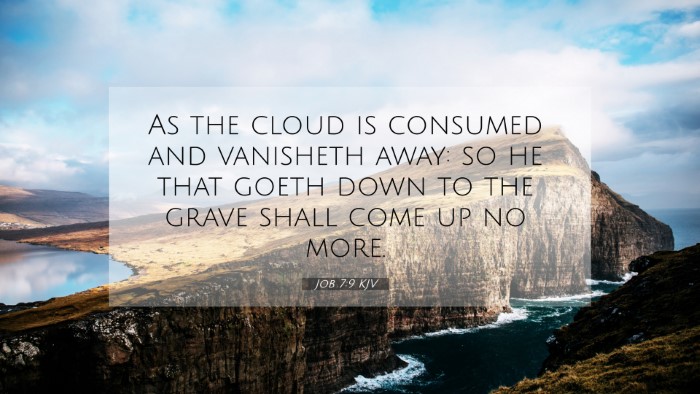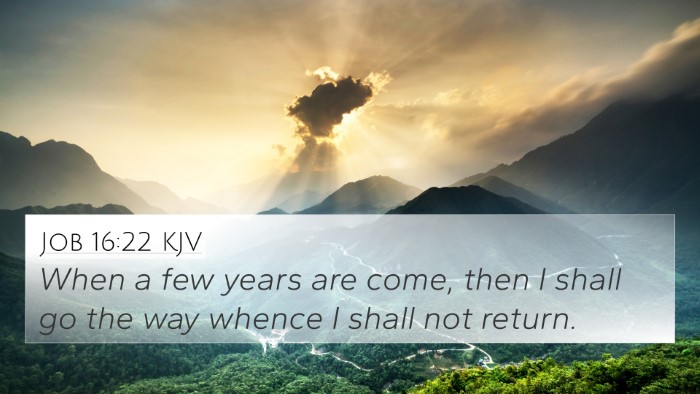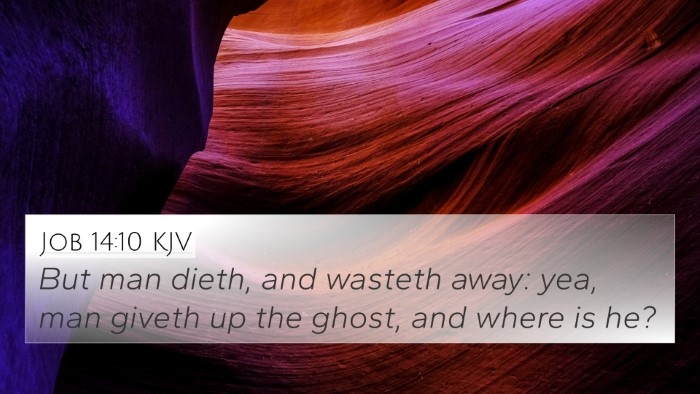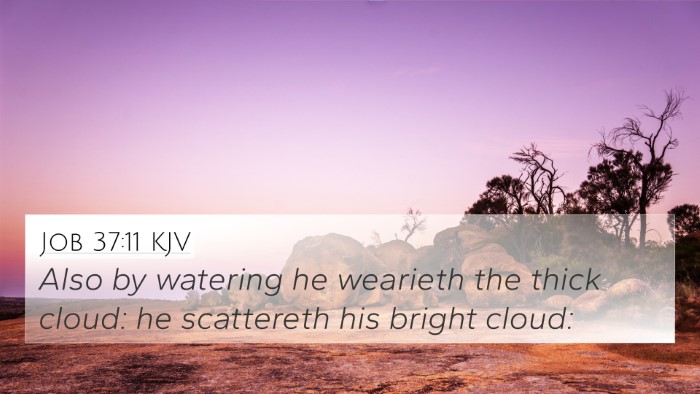Old Testament
Genesis Exodus Leviticus Numbers Deuteronomy Joshua Judges Ruth 1 Samuel 2 Samuel 1 Kings 2 Kings 1 Chronicles 2 Chronicles Ezra Nehemiah Esther Job Psalms Proverbs Ecclesiastes Song of Solomon Isaiah Jeremiah Lamentations Ezekiel Daniel Hosea Joel Amos Obadiah Jonah Micah Nahum Habakkuk Zephaniah Haggai Zechariah MalachiJob 7:9 Similar Verses
Job 7:9 Cross References
As the cloud is consumed and vanisheth away: so he that goeth down to the grave shall come up no more.
Uncover the Rich Themes and Topics of This Bible Verse
Listed below are the Bible themes associated with Job 7:9. We invite you to explore each theme to gain deeper insights into the Scriptures.
Job 7:9 Cross Reference Verses
This section features a detailed cross-reference designed to enrich your understanding of the Scriptures. Below, you will find carefully selected verses that echo the themes and teachings related to Job 7:9 KJV. Click on any image to explore detailed analyses of related Bible verses and uncover deeper theological insights.
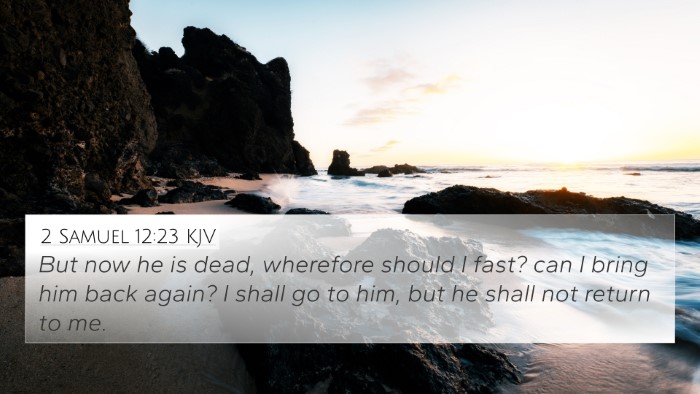
2 Samuel 12:23 (KJV) »
But now he is dead, wherefore should I fast? can I bring him back again? I shall go to him, but he shall not return to me.
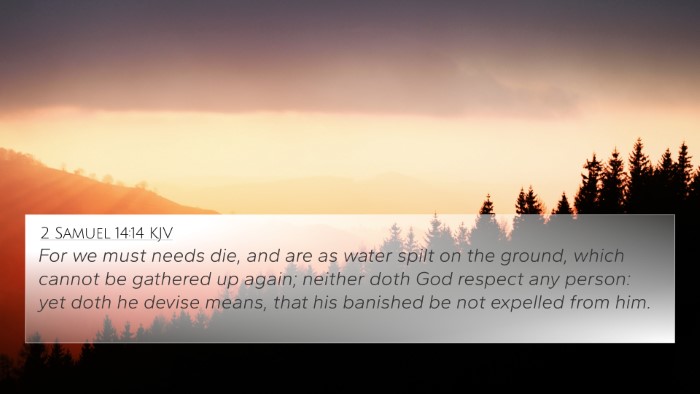
2 Samuel 14:14 (KJV) »
For we must needs die, and are as water spilt on the ground, which cannot be gathered up again; neither doth God respect any person: yet doth he devise means, that his banished be not expelled from him.
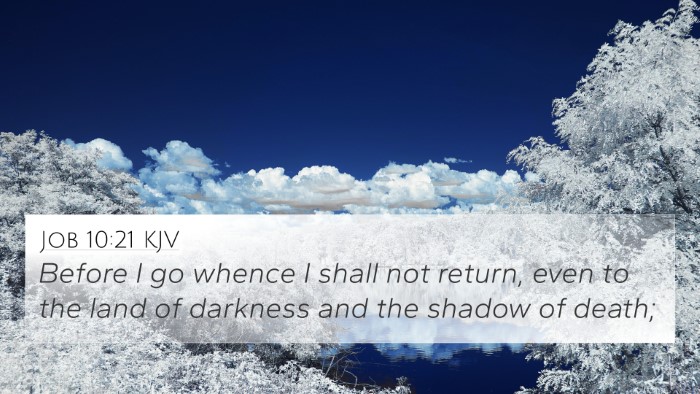
Job 10:21 (KJV) »
Before I go whence I shall not return, even to the land of darkness and the shadow of death;
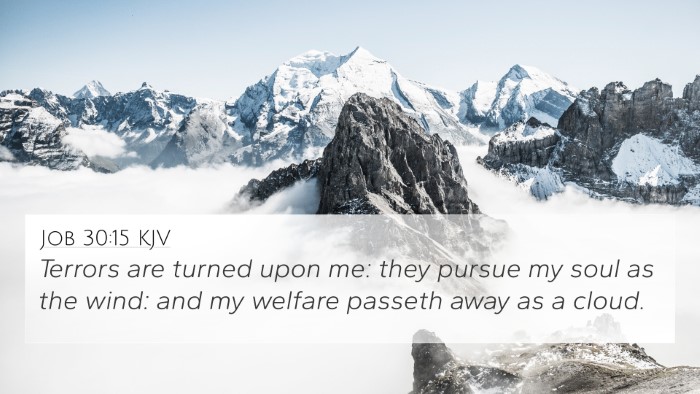
Job 30:15 (KJV) »
Terrors are turned upon me: they pursue my soul as the wind: and my welfare passeth away as a cloud.
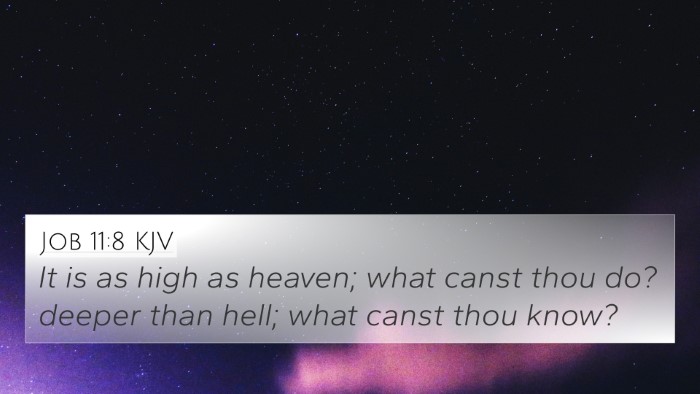
Job 11:8 (KJV) »
It is as high as heaven; what canst thou do? deeper than hell; what canst thou know?

Isaiah 38:11 (KJV) »
I said, I shall not see the LORD, even the LORD, in the land of the living: I shall behold man no more with the inhabitants of the world.
Job 7:9 Verse Analysis and Similar Verses
Understanding Job 7:9
Verse Text: "As the cloud is consumed and vanisheth away: so he that goeth down to the grave shall come up no more."
Verse Meaning and Context
The book of Job is a profound reflection on suffering, divine justice, and the human experience in the face of adversity. In Job 7:9, Job expresses a deep sense of hopelessness about life after death, using the imagery of a cloud that disappears and is lost forever. This analogy illustrates his feelings of transience and the seemingly finality of death.
Insights from Public Domain Commentaries
-
Matthew Henry:
Henry emphasizes the fleeting nature of human life and the sense of loss that comes with mortality. Job compares his despair to the fleeting clouds, demonstrating his deep anguish about the permanence of death.
-
Albert Barnes:
Barnes notes that Job's lament reflects the common human fear of death and the anxiety of what lies beyond. He highlights the darkness of despair and the longing for restoration, which permeates Job's speeches.
-
Adam Clarke:
Clarke points out that Job's statement may indicate a belief that death is a state of eternal separation, paralleling the Jewish thought of the time. This view further encapsulates the existential crisis faced by Job as he grapples with his suffering.
Thematic Connections
Job 7:9 serves as a rich point of connection to various themes found throughout the Bible. Below are several cross-references that echo similar sentiments about life, death, and the human condition:
- Ecclesiastes 1:4: "One generation passeth away, and another generation cometh: but the earth abideth forever." - Reflecting on the cycle of life.
- Psalms 39:5: "Behold, thou hast made my days as an handbreadth; and mine age is as nothing before thee: verily every man at his best state is altogether vanity." - Acknowledgment of life's brevity.
- Psalms 102:26: "They shall perish, but thou shalt endure: yea, all of them shall wax old like a garment; as a vesture shalt thou change them, and they shall be changed." - Comparison of the eternal and the temporal.
- Isaiah 40:6-8: "The voice said, Cry. And he said, What shall I cry? All flesh is grass, and all the goodliness thereof is as the flower of the field." - The transience of human life.
- 1 Peter 1:24: "For all flesh is as grass, and all the glory of man as the flower of grass. The grass withereth, and the flower thereof falleth away." - Continues the theme of human fragility.
- Job 14:14: "If a man die, shall he live again? all the days of my appointed time will I wait, till my change come." - A direct reflection on hope amidst despair.
- Hebrews 9:27: "And as it is appointed unto men once to die, but after this the judgment." - The inevitability of death and the afterlife.
- James 4:14: "For what is your life? It is even a vapour, that appeareth for a little time, and then vanisheth away." - The fleeting nature of existence.
- Romans 5:12: "Wherefore, as by one man sin entered into the world, and death by sin; and so death passed upon all men, for that all have sinned." - The theological implications of death.
- 2 Corinthians 5:1: "For we know that if our earthly house of this tabernacle were dissolved, we have a building of God, an house not made with hands, eternal in the heavens." - Offering hope of resurrection.
Inter-Biblical Dialogue
Job 7:9 fosters a dialogue between the Old and New Testament themes, illustrating the continuity of human concern over mortality and divine justice. The connections between various scriptures deepen our understanding of how biblical authors address similar fears and hopes regarding existence and the afterlife.
Conclusion
In conclusion, Job 7:9 encapsulates a moment of great despair and contemplation on the nature of life and death. By examining the verse through commentaries and cross-referencing related scripture, we gain a richer perspective on Job's lament and its theological implications for understanding human existence.
Further Study Tools
To explore these connections further, one may utilize:
- Bible concordances
- Bible cross-reference guides
- Comprehensive Bible reference resources
- Cross-referencing Bible studies
